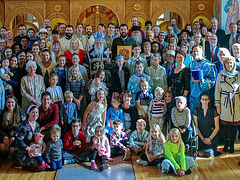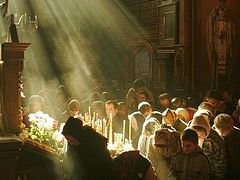The Parish and the Home Church
The Parish temple is indissolubly linked to the family life of its parishioners. The Orthodox family, in the words of St. Paul, is the “home church.”[1] The parish can be considered a kind of confederacy of all the small churches that are Orthodox households. If an Orthodox family remains closely connected to the church the true spirit of the church naturally pervades it, forming fertile ground for its members’ spiritual growth and development. Losing the church in a family inevitably leads to a tragic alienation from the Church, ending in spiritual error and mental isolation for the younger generations. The home life of a truly Orthodox family is firmly founded on the church. This vivid and unshakable foundation gives rise to moral fiber, integrity, honesty, courage, clarity and a spirit of perseverance in the younger generations. Home prayer, a home graced with the presence of icons and oil lamps before them, the cycle of feasts and fasts, all of such a family’s life is formed and established under the grace-giving influence of the Church and the parish temple.
The key task set before each parish, each family, every individual Orthodox Christian, is this: to confess that you are an indivisible part of the Church of Christ and direct your entire personal, family and parish life on the basis of that confession, focusing your spiritual strength and consecration in the parish church.
True parish life grows organically from within, from the Altar, the Throne, the Eucharist. Strictly speaking, the entire church establishment, its “organizational” aspect, is based around the community gathering for the Eucharist. As Fr. Alexander Schmemann notes, that is precisely how the first generation of Christians understood community life:
“Only the Sacraments made this organization of Christians something more than a simple human institution with its directors and subordinates, authority and obedience. Instead this was a living organism imbued with the Holy Spirit. All human “service”, all human interrelations become in it a manifestation of that same Spirit, a service to Christ Himself among His brethren.”[2]
Parish Charitable Activity and Diaconia
We find evidence in the works of the early Christian apologist Tertullian of the strong love that existed between Christians in those days. Tertullian recounts how examples of Christian love astonished and converted some pagans: “See, they say, how they [Christians] love one another, for they themselves [the pagans] are animated by mutual hatred; how they [Christians] are ready even to die for one another, for they themselves [the pagans] will sooner put death”.[3] The early Church was a school of love, compassion and forgiveness.
Metropolitan Anthony (Bloom) of Surozh maintains that this cannot be said today, that it does not exist even in the smallest gathering. If there is love, it is a general love, that which may also be found among pagans and unbelievers: the natural love of one creature for another. This is not the love that was born of the miracle of redemption which the Holy Spirit has performed in us.”[4]
We live in an age of unprecedented egotism and hypocrisy. We are often concerned by pollution of our environment, church jurisdiction matters, religious conflicts, ecumenism, wars, and natural disasters. In other words, we show passionate but at the same time quite remote concern about matters affecting people we are not likely to ever meet. Meanwhile there are people right next to us in this modern life in need of our support: the elderly, the infirm, people without enough to eat, the homeless and the indigent. Sometimes these people aren’t looking for just a handout, but for kindness and affection.
In the Gospel, we read that the paralytic waited thirty-eight years for the mercy of others.[5] He waited all that time for someone who would lower him into the healing waters. That someone never materialized until the Savior approached the pool. Christ asked the invalid: “Wilt thou be made whole?” and the man answered: “Sir, I have no man, when the water is troubled, to put me into the pool.” That phrase, “I have no man,” has the same tragic ring in our days as they did in those.
How many paralytics are there in our midst? Invalids not only in body, but souls that are suffering and ‘have no man’ to lower them into the healing pool? The pool of faith, the pool of hope and of love, the pool of boundless grace filled with therapeutic and miraculous restorative strength, transfiguration and resurrection. This pool is Christ’s Church which does not move “at a certain season,” as the one in the Gospel, but is constantly moved with the strength and grace of the Holy Spirit, “heals that which is infirm and completes that which is lacking.”[6]
Each parish must acknowledge itself to be that inexhaustible fountain of Divine Grace for its particular location. Every parish community can take on the care of several forgotten elderly people, the sick, the poor and the lonely. The Church cared for widows and orphans from the first years of its existence. We must turn to our selfless parishioners and make them aware that needs go beyond providing for their beloved church, that we must also provide for our brothers and sisters in Christ who are in need. I know from personal experience that the call will be answered.
The Apostle Paul gives us the grace-filled formula for diaconia: We then that are strong ought to bear the infirmities of the weak, and not to please ourselves. Let every one of us please his neighbor for his good to edification.”[7]
Here we have the root of charitable pastoral service: it is serving one’s neighbor not for our own benefit, not for earthly rewards, notoriety or self-aggrandizement. This is not service for someone because we are fond of him. Quite the opposite, we give in spite of the weakness, the fallen nature, sins and imperfections of our neighbor. That is why the Apostle speaks of bearing the infirmities of the weak. He calls on us to please, not just to help. To please, as he says: for his good to edification, because through serving our neighbor we serve ourselves, benefit ourselves, teach ourselves, “edifying” ourselves in what constitutes the fullness of Christian life. For even Christ pleased not himself[8] as St. Paul writes. He pleased not Himself, but us, sinners unworthy of His Divine ministry on our behalf.
That serving and loving the lonely and suffering is one of the Church’s most important missions is beyond question. St. Paul writes of the Church: “And whether one member suffer, all the members suffer with it,”[9] and if we do not feel that we are not of the Church.
To be continued…
Parish Life, September 2024
St. John the Baptist Cathedral, Washington, DC
[1] And all that believed were together, and had all things common... And they, continuing daily with one accord in the temple, and breaking bread from house to house, did eat their meat with gladness and singleness of heart, praising God, and having favour with all the people. (Acts 2: 44–46)
[2] Protopriest A. Schmemann, The Historical Road of Eastern Orthodoxy, Chekhov Press, NY, 1954, p. 50.
[3] Tertullian, Apology, 39.7.
[4] “The Path of Repentance”, The Danilov Good News (Moscow, 2005), p. 16.
[5] John 5:1–15.
[6] From the sacramental formula pronounced at the ordination of a priest: “The divine grace, which always heals that which is infirm and completes that which is lacking, ordains the most devout (name) to the office of Priest. Let us, therefore, pray for him, that the grace of the All-Holy Spirit may come upon him.”
[7] Rom. 15: 1–2.
[8] Rom. 15: 3.
[9] 1 Cor. 12:26.




